Unbelievable

Our topics for this weeks readings, lectures and class discussions included the #MeToo Movement, Trumpism, rape culture, Harvey Weinstein’s sexual assault case, campus sexual assault, and many more. On top of this I was intrigued by a suggested final project topic, which was to watch and review the 2019 Netflix series Unbelievable. Although I did not decide to focus on this as my final topic I still decided to watch the show and definitely recommend it. It depicts many of the discussions brought up in our material for this week, but more specifically focuses on the contrast between how a sexual-assault investigation should and should not take be conducted.
Ruth B. Mandel
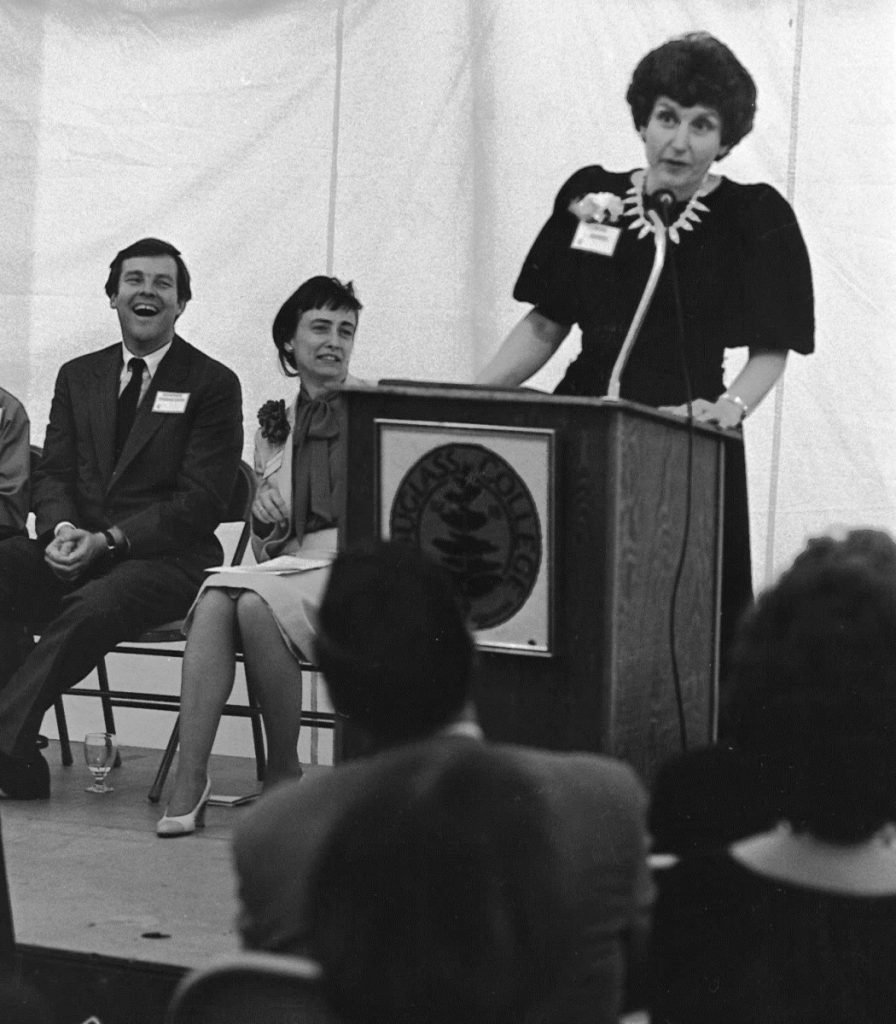
Town Topics, The Princeton’s Weekly Community Newspaper since 1946, published an article titled, “Ruth B. Mandel, a ‘Story of Overcoming,’ A ‘Profound’ Influence on Women in Politics”, on April 15th, 2020. The author, Donald Gilpin, discusses the recent loss of Ruth B. Mandel, on April 11th, 2020, to ovarian cancer, at the age of 81. Mandel escaped the Holocaust with her parents as a child and moved to the United States in 1947. She attended Brooklyn College where she received her bachelors degree in English, and then continued on to the University of Connecticut, where she received her masters and Ph. D. degrees in English and American Literature. Among her many accomplishments she founded and directed the the Eagleton’s Center for American Women and Politics (CAWP) from 1971 to 1994. She was also a professor of both English and Politics at Rutgers University and a Senior Scholar at the CAWP. In addition, she served on the United States Memorial Council and was the founding chairperson of the United States Holocaust Memorial Museum’s Committee on Conscience.
Her influence on women in politics is prominently seen through her contributions specifically to the CAWP, which became known as the “premiere research and education institution in the country for the study of women in politics” (The New York Times). Another contribution she made was the first book length account of women’s experiences as candidates for political office, titled, In the Running: The New Woman Candidate. At the Eagleton Institute she brought together many people in her building and leading of many leadership, education and research programs. Most importantly she was “widely known for convening groups of women and for training programs such as the NEW Leadership program and the Ready to Run program, which she initiated… she really understood the need to make sure that women had the skills to be able to function effectively in the political arena” (Tuck-Ponder).
“Everybody who is anybody inn politics knew and respected Ruth. They may not have always agreed with her, but they certainly respected and understood her impact on the political landscape in New Jersey and nationwide.”
Former Princeton Township Mayor Michelle Tuck-Ponder
“She had the holistic view of the role women could play in political leadership, and from her position at Eagleton she constantly moved that agenda forward. It has made a difference in policies across the state. It’s profound. Her impact was profound.”
Former Princeton Township Mayor Michelle Tuck-Ponder
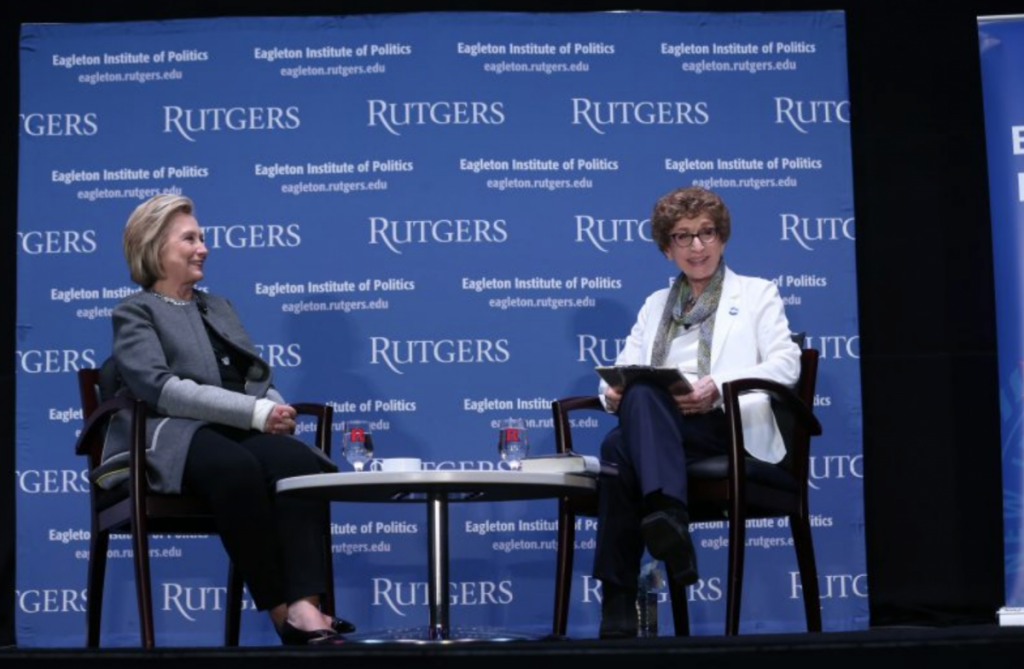
“When we count the leaders who helped bring us to a place where it’s not outlandish for a woman to be elected as a mayor, a congresswoman, a governor, or any other office, Ruth will be listed among them, both in New Jersey and nationwide. Her life’s story is one of overcoming — escaping the Holocaust, achieving feats in higher education unlikely for a woman in her time, and helping to found what would become a nationally-recognized institution for understanding the potential and power of women in office, the Center for American Women and Politics at Rutgers University.”
Congresswoman Bonnie Watson Coleman
“Ruth was at the forefront of shaping the kind of civic engagement and leadership that would help this nation live up to the ideals we associate with our founding — the principles of freedom, of equity and representation for all. She did so across boundaries of party, religion, race, and background, and we are all better for it.”
Congresswoman Bonnie Watson Coleman
I think that this connects to our discussion this week about women in politics very nicely. After reading the papers and articles, along with watching the powerpoint presentation and the videos attached, for this week, I was left feeling very hopeless. After reading about Ruth B. Mandel, I am again hopeful. Although many strides have been made for women in the political sphere, thanks to women and people like Ruth, there is clearly still so much work to be done. I believe that someday, with the help of Ruth’s legacy and influence on our generation, we will get to a place where the nation’s ideals we associate with its founding, will be fulfilled for women, including women who are a part of civic engagement and leadership.
Raised Without Gender
This weeks readings and discussions about Transmisogyny got me thinking about this video that I watched in a sociology course that I took last semester. A VICE host, Amelia Abraham, traveled to Sweden “the world’s most forward thinking country when it comes to questioning gender – to find out what it’s like to grow up without the gender binary.” Amelia spends and documents her time with a gender non-conforming family. Del LaGrace Volcano who was born intersex goes by ‘mapa’ in their family, meaning mom and dad, the children Mika, who is 5, and Nico, who is 3, and their grandma Margareta. In Sweden, the gender-neutral pronoun is ‘hen’ and is commonly used. In addition, their school plan forbids enforcing gender stereotypes, and the government has funded gender neutral Kindergartens with gender aware teachers.
Amelia attends Mika’s ‘gender aware’ kindergarten to see what the teachers and other children think about Mika’s gender expression, who is of the male sex, but whose gender expression is ‘feminine’ under the gender binary.
The video’s story is very informative and I found it really interesting to think about whether this gender neutral/gender aware system would ever be implemented in America. I think this is an important lens and example to bring into our discussion as it connects to the trans rights movement and illuminates another dimension of the discussion, which is what it would be like to grow up without the gender binary. While watching I questioned whether the children’s expressional choices were truly not influenced by the gender binary, because at one point Mapa holds up a couple dresses and asks something like “what do you want to wear today Mika?”, which seemed as though one option, a dress, was being offered, but this may or may not have been just one instance. Whether Mapa had some underlying bias on what gender expression was desired for Mika is unclear, but either way the concept of ‘growing up without gender’ is still an interesting one to consider in our discussions.
Disability Stigma
This Huffington Post article by Elyse Wanshel titled, “People Are Celebrating Kodi Lee on ‘America’s Got Talent’ for the Wrong Reasons”, addresses the discussion we had this week on disability. Although this example doesn’t explicitly address women, it illuminates a larger conversation taking place on the stigmatization of disability. In the 2019 season premiere of “America’s Got Talent”, a 22-year old contestant, who was blind and autistic, sang and played piano for the judges. He earned the golden buzzer, which advanced him to the live shows. Kodi Lee, the disabled contestant, put on an incredible performance and videos of it went viral. Although the re-posts and comments seemed supportive of Kodi Lee, Wanshel writes that “the way the talent competition show portrayed him – and the way most non-disabled people and media outlets responded to his performance – echoes offensive stereotypes about disability that reinforce ableism, or discrimination against people who are disabled.” I have included some of the tweets that have been shared on the topic, which exhibit these frustrations, in addition to a statement made by the Center for Disability Rights.
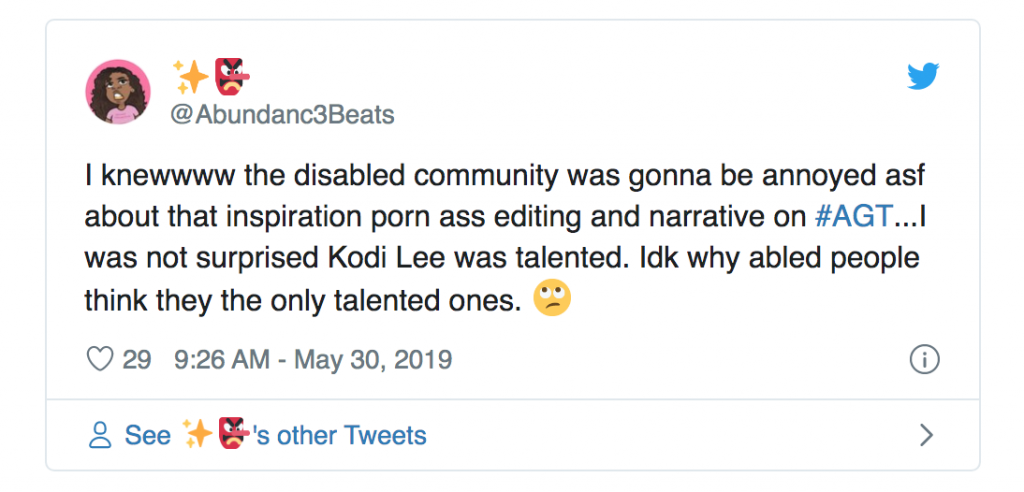
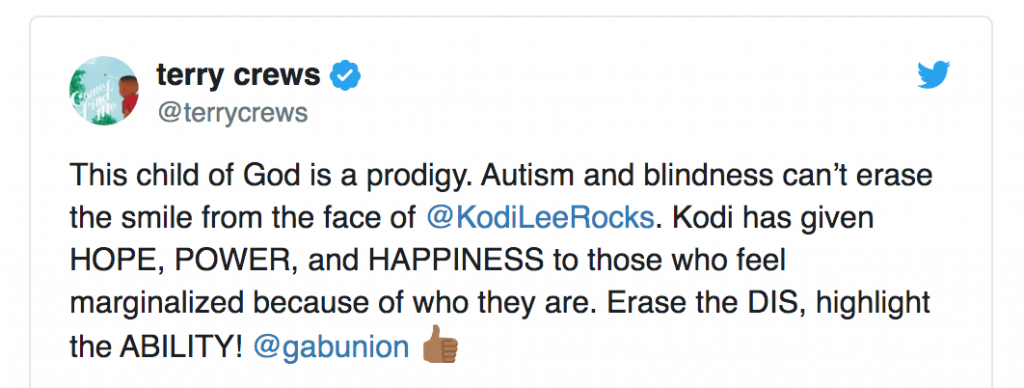
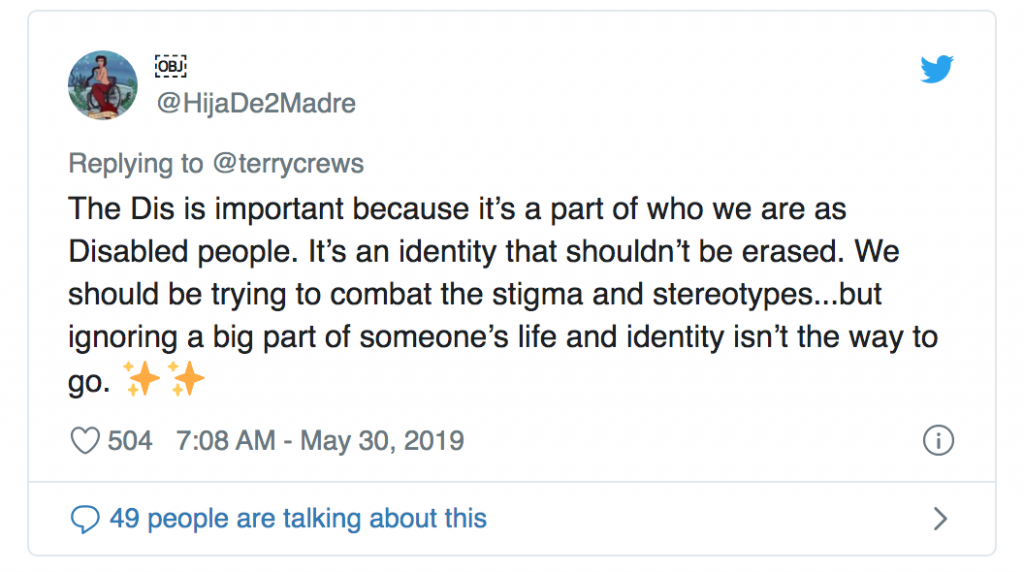
“The media picked up on Kodi Lee’s performance and was quick to show not only how he spoke, but even how he situated himself at the piano, often praising his mother for assisting him. Kodi Lee’s disabilities are as much a part of his identity as one’s heritage or culture. While we agree that Kodi Lee is incredibly talented with his voice and piano skills, we want to be clear that one can be both talented and disabled. By trying to inspire others by showing how Kodi Lee undergoes mundane tasks such as sitting down at the piano, we are only further marginalizing people with disabilities.”
The article also discusses this idea of ‘inspiration porn’, which is explained as the media’s use of Kodi Lee’s disabilities as a ‘tragedy’ to create ‘an inspiring story of overcoming’. Like I said before, frustrations about this depiction were shared on Twitter, and many were made by people from the disability community. These tweets voiced the fact that their disabilities are part of their identity, and that piece of their identity shouldn’t be erased, but instead the stigma and stereotypes associated with the word ‘disability’ should be.
I think that this conversation is very important, and a discussion that people should be having on a greater scale in order to de-stigmatize disability. This connects back to our conversation this week on implementing a disability studies program at Middlebury. Clearly, this is something people are not educated enough on, myself included, therefore, I think implementing this would be beneficial to everyone.
“I made that bitch famous.”
In the two videos attached, the long lasting feud between Taylor Swift and Kanye West is outlined and the music video for his song ‘Famous’ is reviewed. Although there have been many disputes about the authenticity of both Taylor and Kanye’s arguments on the topic, I am simply focusing on Kanye’s use of the word ‘bitch’ in his 2016 song ‘Famous’. In his lyrics he uses ‘bitch’ to refer to Taylor Swift. The lyric reads,
“I feel like me and Taylor might still have sex
Kanye West, 2016.
Why? I made that bitch famous (God damn)
I made that bitch famous”
In class readings and discussions we have learned about the controlling image of the ‘bitch’. According to Collins the word ‘bitch’ constitutes one representation of the black women, depicting them as aggressive, loud, rude and pushy. In addition, we compared the use of the word in the form ‘bitch’ versus ‘Bitch’, bitch being the negative form and ‘Bitch’ the more positive form, defining the Black women as tough, strong and worth celebrating.
Although Kanye’s use of the word ‘bitch’ isn’t used in the context of a black women, and instead a white women(Taylor Swift), it is still an example of the use of the word in contemporary popular culture. The use of the word in popular culture creates a confusing representation of women, one that is mostly misogynistic when used by men, but other times it is seen as a form of resistance when used by women rappers.
Again, emphasizing the conflict arisen from the use of the word, an Insider article states that Taylor Swifts press rep “declined” Kanye “and cautioned him about releasing a song with such a strong misogynistic message”.
Anti-Feminism at Halftime
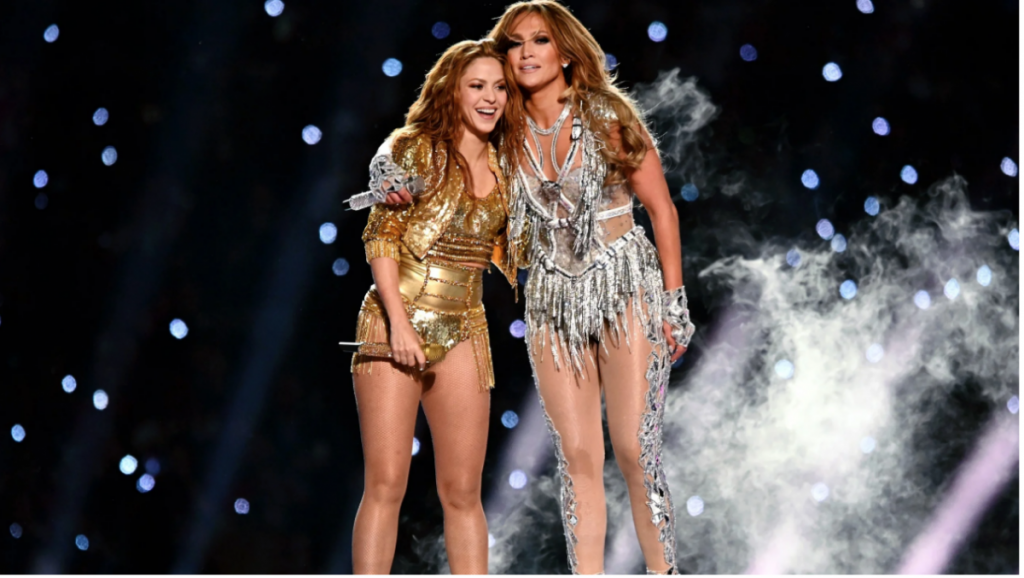
In the past few weeks we have heavily discussed anti-feminist perspectives, including Marabel Morgan’s, Anita Bryant’s, and Phyllis Schlafly’s, along with anti-pornography perspectives, which include Robin Morgan’s and Ann Snitow’s.
In reading some news articles I found myself making connections between the topics discussed in the works of the women listed above and the responses to this year’s Superbowl halftime show. One article caught my eye at first. “The J-Lo and Shakira halftime show sidelined women” by Madeline Fry expresses that although Shakira and J-Lo were supposed to put on a performance that celebrated their Latino heritage and empowered women, Fry believes that it was “oversexualized”, “completely inappropriate for children” and sent a bad message “to young viewers”. She states that seeing these women dressed the way they were on stage, grinding on other performers, and dancing around a stripper pole was disappointing, because she doesn’t think this is an acceptable form of female expression, or entertainment that promotes female empowerment.
“In a day and age when child sexual abuse is ravaging public schools, the Catholic Church, Hollywood, and every institution in between, that’s no reason to normalize hypersexualization of content”
“Thats not empowerment. It’s self-objectification.”
Madeline Fry, Washington Examiner. Feb. 3rd, 2020.
This article and opinion do not sit very well with me. I specifically dislike this journalist’s comment involving sexual abuse. I had a hard time understanding her connection between their performance and the rates of sexual abuse in today’s society. These two women got up on stage and performed, something they do as a profession, and were dancing on stage in a specific way while wearing outfits similar to many other women performers today. Certain things from this performance are arguably inappropriate for children, but in no way, do I see their performance as an invitation for sexual harassment. Just because a woman wants to perform and dress a certain way doesn’t mean that they are objectifying themselves to sexual abuse. If anything, I think that it is empowering in the sense that women should be allowed to wear what they want and dance how they want, without having to worry about sexual threats or without people assuming that they are offering their body sexually.
This article and my disagreement with some of her arguments left me wondering. Was Shakira and Jennifer Lopez’s performance anti-feminist, or is Madeline Fry’s opinion anti-feminist?
“The New Science of Blaming Moms”
A 2014 MSNBC news article, “The New Science of Blaming Moms”, reports on new health research, specifically referencing a seminar that was held at Harvard University. This seminar consisted of discussions about “maternal imprint syndrome”, “fetal origins of health and disease”, a mother’s diet and “fetal nutrition and growth”, and “the politics of culpability in the maternal-fetal nexus”. Current scientific claims state that “stressed women produce offspring prone to anxiety, depression, schizophrenia, and suicide”…”a mother’s dietary or smoking habits during gestation can ‘program’ her fetus for a future of obesity, heart disease, and diabetes.” Lastly, their findings show that “increasing rates of maternal obesity … can have significant impact on the in utero environment and, thus, on fetal development and the health of the child later in life.”(Metzl)
“A number of epigenetic arguments drop the responsibility for children’s later-life diseases, behavior and emotions firmly into the laps of their moms.”
Jonathan Metzl, 2014. MSNBC.
Metzl addresses the history of mother blaming, but specifically in reference to medicine. This history consisted of abundant of absurd theories that blamed moms for their children’s illnesses. Sigmund Freud, who we have addressed in class, was one of the main culprits of this. Metzel explains that “he blamed castrating and schizophrenic mothers for producing neurotic and schizophrenic” children. In addition, ‘refrigerator mothers’, “mothers so cold in their parenting that they seemed never to defrost”(Metzl), were said to have caused autism in their kids.
We know now that these theories aren’t correct, but even today in despite of how much science has progressed and how much we understand about genetics, this article addresses the fact that “mother blaming” seems to still be taking place. Many people are worried about the crossing over of maternal origins and “bad parenting”, but Metzl offers that…
“if nothing else, history teaches us to proceed with caution. Even if we uncover everything there is to know about the maternal-fetal nexus, we’ve learned that nothing is ever straightforward when mothers and science mix.”
